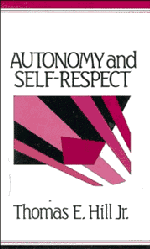Book contents
- Frontmatter
- Contents
- Sources and acknowledgments
- Introduction
- 1 Servility and self-respect
- 2 Self-respect reconsidered
- 3 Autonomy and benevolent lies
- 4 The importance of autonomy
- 5 Symbolic protest and calculated silence
- 6 Moral purity and the lesser evil
- 7 Self-regarding suicide: a modified Kantian view
- 8 Ideals of human excellence and preserving natural environments
- 9 Weakness of will and character
- 10 Promises to oneself
- 11 Social snobbery and human dignity
- 12 Pains and projects: justifying to oneself
- 13 The message of affirmative action
- Index
11 - Social snobbery and human dignity
Published online by Cambridge University Press: 05 June 2012
- Frontmatter
- Contents
- Sources and acknowledgments
- Introduction
- 1 Servility and self-respect
- 2 Self-respect reconsidered
- 3 Autonomy and benevolent lies
- 4 The importance of autonomy
- 5 Symbolic protest and calculated silence
- 6 Moral purity and the lesser evil
- 7 Self-regarding suicide: a modified Kantian view
- 8 Ideals of human excellence and preserving natural environments
- 9 Weakness of will and character
- 10 Promises to oneself
- 11 Social snobbery and human dignity
- 12 Pains and projects: justifying to oneself
- 13 The message of affirmative action
- Index
Summary
The Revolution that raised banners to “Liberty, Equality, and Fraternity” was more than a political revolution. It was also a social revolution that spread radical ideas about how one should view one's fellow human beings. Revolutionaries demanded increased recognition of the rights and needs of the common man, but they also insisted on respect. They charged that an elite had misappropriated to itself not only wealth and privilege but also symbols of “honor” and “dignity” unwarranted by inheritance, achievement, or individual merit. Even more radically, some argued that all humanity has a dignity independent of social class and individual distinctions. Among these, Rousseau was the most eloquent, and Rousseau was instrumental in convincing Kant to place human dignity at the core of his ethical theory.
The political implications of this idea of human dignity have been much discussed, but the implications for our social attitudes and personal relations have been comparatively neglected. This may be because various forces have conspired to reduce the more obvious manifestations of class snobbery, which was the immediate target of the social revolution. In our more individualistic world, however, class snobbery readily gives way to new forms of merit snobbery that are also incompatible with human dignity. In fact the most familiar ground for opposing class snobbery, i.e., respect for individual merit, is often stretched to serve as the basis for more modern forms of elitism.
- Type
- Chapter
- Information
- Autonomy and Self-Respect , pp. 155 - 172Publisher: Cambridge University PressPrint publication year: 1991
- 5
- Cited by



